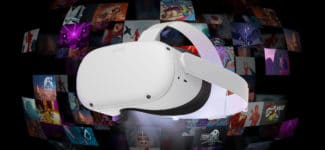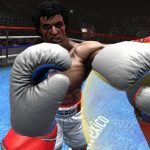Weeks before the release of Oculus Quest 2 last year Facebook’s technical guide John Carmack offered his yearly talk with a stream-of-consciousness view into his thoughts on the state of consumer virtual reality and Facebook’s efforts in the market.
“This is very close to a pure win,” he said. “Quest 2 is better, faster, cheaper, and we’re making a ton more of them.”
The Oculus Quest standalone self-contained all-in-one VR headset released in May 2019. Its successor just 16 months later, Quest 2, dropped $100 off the starting price — now $299 — when it launched in October 2020 with version 20 of Facebook’s software.
A year later, Quest 2:
- Runs version 33 of the system software and it can connect to a capable VR PC wirelessly to play PC VR games via Air Link.
- Quest 2 can multitask now, with traditional flat screen Android apps running alongside the Oculus Browser to offer the basics of a VR personal computer.
- The Quest 2’s Guardian and Insight tracking system is also much smarter now. You can mark the position of your couch or your desk and incorporate those pieces of furniture into your experience. You can see a pass through view of your surroundings through the onboard cameras and walk out of your play space to see the physical world faded in, or walk into another room and sit down at your desk back in VR without taking the headset off.
- You can bring your Bluetooth keyboard into VR, and use a mouse or trackpad to cursor over content.
- Visuals are boosted up to 120 Hz in some apps on Quest 2 — up from 90 Hz with an experimental update at launch and up from 72 Hz for the original Quest.
- Some developers can improve hand tracking in their apps too with more expressive avatars supported in a few games.
- If you buy a Quest 2 in year 2 of its life for the same $299 you’ll be getting 128GB of internal storage. That’s double from the entry level headset at its launch, and plenty of storage to install sizable worlds to visit like Myst, The Walking Dead: Saints & Sinners, Resident Evil 4, and even Medal of Honor: Above And Beyond.
- There are rapidly growing communities around Quest apps like fitness-focused Supernatural as well as excellent replacements for popular physical activities, like ping pong and mini golf. So it is becoming easier to find people who want to use VR the same way as you, and there’s support and friendship to find in those groups.
- There are a ton of accessories for the Quest 2 and more seemingly being announced all the time. There’s of course the rigid straps with tightening dials to better balance weight, the charging stand from Anker and silicon covers from VRCover. Rebuff Reality also has the VR Power 2 battery pack as well as the VR Ears off-ear headphones, plus plenty of other hand straps and decorative accessories to consider as well.’
- Horizon Workrooms from Facebook pushes the headset to its computational limits with an app that provides a passthrough view of your hands, keyboard and desk, along with a Remote Desktop app and incredible audio quality to make meetings and working with others in VR more enjoyable. You can even use a Touch controller like a pen and write on your desk as if it is a whiteboard.
All of this comes before Facebook reveals anything definitive about its future software and hardware roadmap. We know Facebook is developing a Quest Pro and its own Horizon tools, but earlier this year Facebook’s head of VR indicated that Quest 2 would be on the market “for a long while” and called it the “best bet for the most accessible way to get into VR and have a great experience.” Facebook Connect will be held on October 28 this year and we have every expectation that leaders at the company will be looking to tease upcoming games and features for Quest 2, like the Ubisoft games in development and the “space sense” feature that should warn you if something comes into your play area.
Facebook has a sizeable percentage of its 60,000+ workers focused on developing VR and AR technologies, and the company offered to buy all of them a Quest 2. Might there be 10 million Oculus Quests out in the world much quicker than anyone anticipated? We may find out pretty soon.





